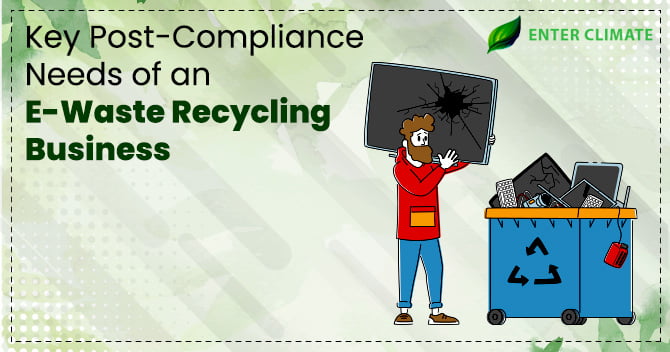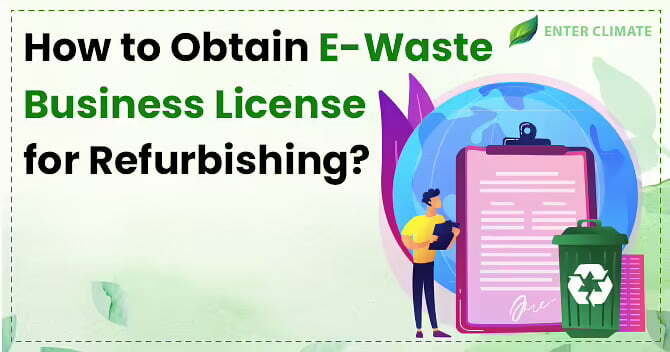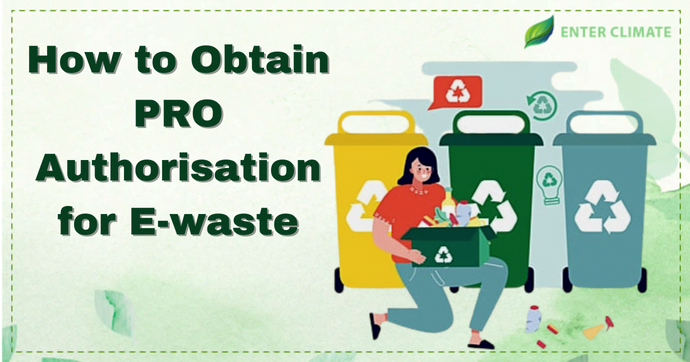Key Post-Compliance Needs of an E-Waste Recycling Business: An Overview
 23 Jul, 2022
23 Jul, 2022 
The E-waste Management Rules 2016 came into effect in October 2016 as a crucial tool to demarcate the individual responsibilities of manufacturer, producer, consumer, bulk consumer, collection centres, dealers, e-retailer, refurbisher, dismantler and recycler. The increasing amount of e-waste in the country and the challenges faced due lack of specified SOP for recyclers were a big problem. Technical and operational interventions were identified to be vital for e-waste management businesses to maximise material recovery and minimise environmental degradation and human health risks. A need for post compliance framework was also felt for the collection, transportation or dismantling of E-waste. In 2018, the amendment to E-waste Management Rules 2016[1] rules was made for channelising the e-waste generated towards authorised dismantlers and recyclers to regulate and streamline the e-waste recycling sector. An e-waste recycling business that could be in the form of collection, transportation, storage, dismantling, refurbishing, processing and disposal of e-waste was required to follow Key Post-Compliance Needs of an E-Waste Recycling Business. Growing a business in any of these mentioned segments required adherence to specific post-compliance by the business owners and the individuals involved in the recycling. For the purpose of this article, we will be focussing on the Key Post-Compliance Needs of an E-Waste Recycling Business.
Meaning of Post compliance
Post compliances are the legally mandated Waste management compliance that critical for handling and disposal of hazardous e-waste. It includes compliance in the form of safety protocols and restrictions on the collection, transportation, dismantling, processing and disposal of e-waste. Any e-waste processing business must follow the guidelines specified in their authorisation and consent NOCs. Recycler must have a clear yet comprehensive view of the Key Post-Compliance Needs of an E-waste recycling business in order to maintain a risk-free working environment and avoid future legal hassles and penalties.
Segments of e-waste business requiring adherence to post compliance
E-waste Collectors and Transporters
They are responsible for collecting e-waste on behalf of producers, dismantlers, PROs, recyclers or refurbishers, as well as waste originating from orphaned products. The Key Post-Compliance Needs of the collectors and transporters are as follows.
- To ensure that facilities are maintained as per the standard guidelines issued by CPCB from time to time.
- To ensure that the e-waste collected by collection centres is stored in a secure manner till it is sent to an authorised dismantler, refurbisher or recycler.
- To ensure that the local environment is unharmed during the storage and transportation of e-waste
- To maintain records in Form-2 of the e-waste handled as per the guidelines of CPCB and make such records available to the CPCB or SPCB whenever required.
- The transportation of e-waste must be carried out as per the manifest system whereby the transporter shall be required to carry specific documents (three copies) prepared by the sender, giving the details of the e-waste.
E-waste Dismantlers
The dismantler of e-waste also needs to follow the Key Post-Compliance Needs of an E-Waste Recycling Business. It will include the following roles.
- To ensure that the facility and dismantling units are built following the CPCB standards and updated from time to time.
- To ensure that the dismantling processes do not have any adverse effect on human health and on the environment.
- To ensure that e-waste is segregated after dismantling is sent to the authorised recycling facilities for recovery of materials.
- To ensure that non-recyclable or non-recoverable components are sent to authorised treatment storage and disposal facilities only.
- To maintain a record of e-waste collected, dismantled and sent to the authorised recycler in Form-2 and make such record available to the CPCB/ SPCB whenever required.
- To file a return in Form-3 to the SPCB on or before the 30th of June every year.
- Not to indulge in recovery or refining of materials from e-waste unless authorised.
E-Waste Refurbishers
E-waste refurbishers are also required to meet the Key Post-Compliance Needs of an E-Waste Recycling Business to legally function in the country. These compliances are mentioned below.
- Collecting e-waste components replaced during refurbishing and channelling them to an authorised dismantler or recycler.
- To submit details of all e-waste produced by them to the concerned SPCB every year.
- To ensure that environment is not harmed during the storage and transportation of e-waste.
- To ensure that the refurbishing process does not adversely affect the health of workers and the environment.
- To ensure that the e-waste thus generated is safely transported to authorised collection centres, dismantlers, or recyclers.
- To file annual returns in Form-3 to the concerned SPCB on or before the 30th of June every year.
- To maintain detailed records of the e-waste handled in Form-2 and make it available for scrutiny to the CPCB/ SPCB.
E-waste Recyclers and Disposal Units
Key Post-Compliance Needs of an E-Waste Recycling Business apply to E-waste Recyclers and Disposal Units too. They have mentioned in the following sections
- To ensure that the facility and recycling units are built following the CPCB standards and updated as per guidelines issued in future.
- To ensure that the recycling processes do not have any adverse effect on the health and the environment.
- To maintain records of recycled e-waste and make it available to CPCB/SPCB when demanded.
- To ensure that residue generated during recycling is disposed of in an authorised treatment storage disposal facility only.
- To file annual returns in Form-3, to the concerned SPCB on or before the 30th of June every year.
Penalty for Non- Compliance
Non-Compliance with the regulation and guidelines by entities involved in the e-waste business is considered causing environmental damage under the Environment Protection Act. The CPCB is the nodal authority that can take action against any non-compliant units involved in the collection, transportation, dismantling, refurbishing, recycling and disposal of E-Waste. If the SPCB or CPCB finds any unit not complying with the issued guidelines, it can impose a penalty in the form of environmental compensation or revoke the authorisation and direct such units to shut down. However, an opportunity to present their side is given to the defaulter before any action is taken.
Conclusion
Post compliance is an irrefutable part of the authorisation certificate issued to an e-waste recycler to carry on its business. The license to operate the business are subject to compliance with these rules. The rising awareness among the masses, technological advancement in the waste processing industry and the ever-tightening environmental laws in the country are indicators of change in the waste management sector and will ultimately mean that only authorised and law-abiding businesses will prosper in the future. Post-compliance rule that the e-waste businesses need to adhere to has been made after years of study and deliberation among the CPCB, SPCBs and environmental and safety experts. They may seem like an additional burden to a small waste business, but they benefit the business in the long run. The cost incurred by compliance is negligible compared to the profit the business can bring through the economies of scale in this massive sector with reasonable rate of return. Assistance and guidance from domain experts can reduce the post-compliance responsibility and save time and money for businesses.













